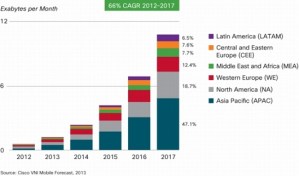 Ask me how I survived for ten days without my phone after losing it late last year, and I’ll tell you: it was touch and go for a while. We use our phones for everything. (Except, ironically enough, to make phone calls.) From games to texts to mapping to random Web searches … everything. In the next five years, we’re going to use them for even more. According to Cisco, within the next half decade, North American mobile users will consume, on average, 6 gigabytes (GB) of data each month. (To put this into perspective, last year the average user consumed a mere 491MB each month, or less than half a single GB.)
Ask me how I survived for ten days without my phone after losing it late last year, and I’ll tell you: it was touch and go for a while. We use our phones for everything. (Except, ironically enough, to make phone calls.) From games to texts to mapping to random Web searches … everything. In the next five years, we’re going to use them for even more. According to Cisco, within the next half decade, North American mobile users will consume, on average, 6 gigabytes (GB) of data each month. (To put this into perspective, last year the average user consumed a mere 491MB each month, or less than half a single GB.)
While smartphones aren’t predicted to be the sole driving force for all of this traffic, at around 50 percent, they will be the biggest offenders, with tablets trailing behind at around 30 percent. Laptops, not surprisingly, are expected to decline to a mere 13 percent.
So what is the significance of this? Now that cell phone providers, like Verizon, are steering clear of unlimited monthly data plans, this means that all of us avid smartphone users will see a rise in our cell phone bills. How much? Well that depends on your provider and the plan you have with them. But whether you plan ahead and pick an appropriate plan or, worse, don’t and succumb to overage fees, you are bound to start turning over a good deal more money to the phone company.


